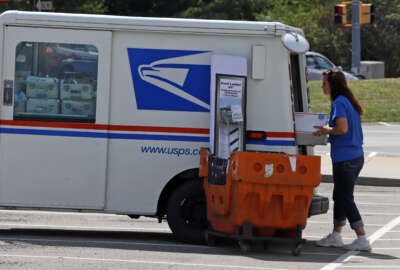The Postal Service is looking to negotiate with its unions over COVID-19 vaccination and testing requirements from the Biden administration.
USPS, in a statement Thursday, said its management is working closely with union leadership ahead of the Occupational Safety and Health Administration’s COVID-19 Vaccination Emergency Temporary Standard (ETS) requiring all employers with 100 or more employees to ensure their workforces are fully vaccinated or show a negative test at least once a week.
“We appreciate the urgency with which the administration is moving to implement new measures to stem the further spread of COVID-19 and its Delta variant. Because the Postal Service is an independent federal agency that operates under a private sector collective bargaining model, modifications to working conditions are mandatory subjects of bargaining,” USPS wrote in its statement.
While subject to OSHA regulations, USPS does not fall under the Biden administration’s latest executive order requiring federal employees to get vaccinated.
Once OSHA issues its emergency rule for vaccines and testing, USPS said it expects to “move quickly to determine its applicability to our employees and how best to implement.”
What remains unclear, however, is how unions will cooperate with USPS to implement the upcoming vaccination and testing requirements.
National Postal Mail Handlers Union President Paul Hogrogian told Federal News Network that the union has yet to hear from USPS regarding vaccination and testing requirements, aside from “preliminary discussions” last week following President Joe Biden’s executive order.
While USPS and the unions are waiting to see OSHA’s emergency rule, Hogrogian said questions remain about deadlines to comply, whether USPS will provide testing or vaccines at worksites and how USPS or OSHA will discipline employees who don’t comply.
“These are all things that have to be negotiated,” Hogrogian said, adding that vaccines and tests should be easily accessible to employees.
The union is asking members for bargaining proposals by January, ahead of contract negotiations set to begin next June.
The American Postal Workers Union is currently in contract negotiations with USPS management, and its current contract expires Sept. 20. APWU officials on Thursday declined to further comment on the ongoing negotiations.
The union, in a statement last week, said it’s waiting to see OSHA’s emergency rule.
“Until this emergency rule is developed, the APWU will not know if it applies to Postal Service employees. Once the emergency rule is released it will be reviewed and discussed with our attorneys and additional information on how it applies will be released,” APWU wrote.
AWPU told its members in July it would ensure USPS does not institute a mandatory vaccine policy, but encouraged all eligible members to get a vaccine.
The National Association of Letter Carriers formally approved its national agreement with USPS in March, and will last through May 2023.
NALC in a website post on Wednesday, said it’s “unclear how the executive orders and emergency rule will affect letter carriers and the Postal Service.”
“As more information becomes available, NALC will review and bargain over any rulings that affect our members,” the union wrote.
USPS currently requires its employees — regardless of their vaccination status — to once again wear masks to prevent the spread of the COVID-19 delta variant. The agency briefly lifted its mask mandate in July for vaccinated employees.
The policy requires USPS employees to wear masks in public-facing settings when there is a state or local face-covering order or directive in place, or when an employee who does not deal directly with the public cannot achieve or maintain social distancing in the workplace.
Copyright
© 2024 Federal News Network. All rights reserved. This website is not intended for users located within the European Economic Area.




